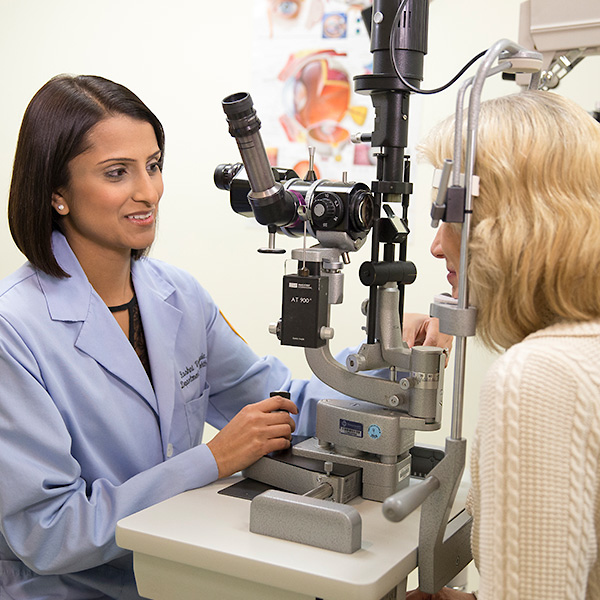Neuro-Ophthalmology
Advanced Techniques to Diagnose and Treat Neuro-Ophthalmic Diseases
Loyola Medicine offers comprehensive, integrated care for conditions and diseases of the eyes, brain, nerves and muscles.
Our highly experienced neurologists and ophthalmologists work as part of a clinically integrated neuro-ophthalmology care team, partnering with otolaryngologists, ophthalmic surgeons, radiologists and other specialists to provide state-of-the-art diagnostic and treatment techniques.
Neuro-ophthalmology services treat conditions that are related to the nervous system. We use almost half of the brain for vision-related activities, including sight and moving the eyes.
Neuro-ophthalmology, a subspecialty of both neurology and ophthalmology, requires specialized training and expertise in problems of the eye, brain, nerves and muscles. Neuro-ophthalmologists complete at least five years of clinical training after medical school and are usually board certified in neurology, ophthalmology or both.
Although some problems seen by a neuro-ophthalmologist are not worrisome, other conditions can worsen, cause permanent visual loss or become life-threatening. Sometimes your problem is confined to the optic nerve or the nervous system, and other times it may be related to a general medical condition.
Loyola’s neuro-ophthalmologists have unique expertise to evaluate a patient’s symptoms from a neurologic, ophthalmologic and medical standpoint to diagnose and treat a wide variety of problems. We have experience and expertise in treating many conditions of the eyes and nervous system, including:
What Will Happen During My Neuro-Ophthalmology Exam?
Your Loyola healthcare team will take the time to get to know you and understand your condition. You will have the opportunity to ask questions and share your concerns.
Your doctor will respond to your questions and concerns prior to moving forward with treatment. Your doctor will discuss all treatment options with you in detail.
During your visit, you can expect:
- The neuro-ophthalmologic evaluation may take a few hours to complete. You will be asked to give an account of your current problem and share your medical history, including previous hospitalizations, operations, serious illnesses, medical problems in your family and medication allergies.
- You will have a complete eye examination. This may include testing of your peripheral vision (visual field test).
- You may have a partial or complete neurologic exam to test your strength, sensation and coordination.
- Your neuro-ophthalmologist will review the records and scans from previous evaluations, if applicable.
- After the examination, your neuro-ophthalmologist will discuss the diagnosis (or possible diagnoses), the need for any additional testing and possible treatment.
How Should I Prepare for a Neuro-Ophthalmology Evaluation?
Your Loyola neuro-ophthalmologist will provide a diagnosis and comprehensive treatment plan as soon as possible. In order to provide your doctor with all relevant information, there are several things you can do:
- Request that your referring physicians send all relevant information to the neuro-ophthalmologist prior to your appointment, including office notes, results of laboratory tests and reports of CT and MRI scans.
- If you have had a CT or MRI scan performed, arrange to pick up the actual test results and bring them with you.
- Have someone else drive you to your appointment and bring sunglasses. You probably will have your pupils dilated during the visit. The eye drops last about four hours and will make things look bright and blurry up close.
- We recommend that eye makeup not be worn to the visit.
- Bring a complete list of medications with you, including the name and dosage of prescription and over-the-counter medications.
Research about Neuro-Ophthalmology

Request an Appointment
Whether you are seeking routine eye care or have a specific vision issue, our team treats a wide range of eye diseases and conditions, including cataracts, glaucoma, macular degeneration and strabismus. Schedule an appointment today.
Schedule a Telehealth Appointment
